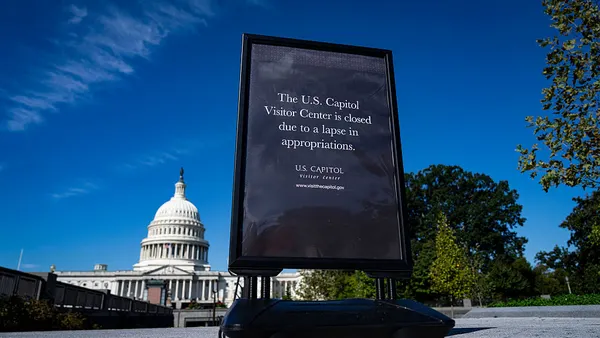Dive Brief:
- The Global Business Travel Association’s annual Business Travel Index Outlook projects moderate near-term growth amid trade policy uncertainty and economic risk.
- Ongoing trade tensions have led to downward revisions in the association’s business travel growth projections for 2025, down from 10.4% projected a year ago to 6.6%, and 2026, from 9.2% projected a year ago to 8.1%.
- This revised outlook falls in line with other recent reports from CoStar and Tourism Economics, both of which downgraded their 2025 and 2026 growth projections for U.S. hotel top-line performance metrics in light of the economic uncertainty following President Donald Trump’s tariff announcements and other recent government actions.
Dive Insight:
Global business travel spending is projected to reach a record $1.57 trillion in 2025, according to GBTA’s latest outlook ─ short of the $1.63 trillion it forecasted last year.
The latest report reflects a moderation from the double-digit gains of the past two years, with a revised projected year-over-year growth rate of 6.6%. The association cited trade tensions, policy uncertainty and economic pressures as the reasons for the downgraded forecast. A rebound to 8.1% growth is projected for 2026, while long-term forecasts remain clouded by geopolitical and economic volatility.
“As we thoughtfully anticipate reaching a new high in business travel spending this year, the outlook is steady ─ but the road ahead is more complex,” said Suzanne Neufang, CEO of GBTA, in a statement. “Trade policy uncertainty, inflationary pressures and shifting global supply chains are reshaping how and where companies travel. This latest forecast reflects the resiliency of business travel and our industry as well as the acknowledgment of the risks ahead.”
The report projects spending will grow in 2027 by 6.4% and 6.3% in 2028. The pace and trajectory of this growth, however, will depend heavily on the resolution — or escalation — of global trade tensions, GBTA noted.
Spending is projected to surpass $2 trillion by 2029, driven by structural shifts in trade, investment and corporate travel behavior.
GBTA’s Business Travel Index report is a comprehensive five-year forecast on business travel spending covering 72 countries and 44 industries and includes insights from 7,300-plus global business travelers.
According to the outlook, business travelers still see value in traveling for work, with 86% rating their trips as worthwhile for achieving business objectives; training and conferences top the list of trip purposes. Most travelers (74%) took between one and five trips in the past year, and over 80% say they are traveling for work as much or more than before 2019. Average trip spending rose to $1,128, up from $834 in the 2024 survey.
These findings weren’t reflected, though, in a recent poll from GBTA that tracked the sentiment and impact of U.S. government actions on business travel. The poll surveyed 950 corporate travel managers, suppliers, travel management companies and other intermediaries across four regions and 45 countries.
The poll results showed that one-third of buyers (34%) continue to expect the number of business trips taken at their company to decline in 2025 as a result of U.S. government actions. A larger percentage of global travel buyers said they have canceled U.S.-based meetings or events as compared to the April polling numbers, and more buyers also reported relocating meetings or events to outside the U.S.
For hotels, this will result in revenue declines, the GBTA predicted. According to the poll, some 48% of suppliers expect a decrease in business travel revenue. Lodging suppliers are the most concerned, with 58% anticipating revenue decreases.
In May, the World Travel & Tourism Council projected that the U.S. would lose $12.5 billion in international visitor spending in 2025.












